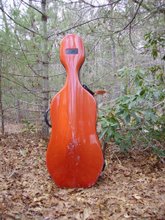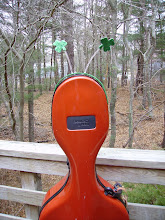The strings went off to practice "Adagio for Strings" last week, under the direction of the first violinist, rather than the conductor, who was spending the time rehearsing the wind instruments' solo piece, selections from Handel's "Water Music."
The grumbling began right away, the violins taking the lead. Well, there are far more violins than cellos, violas, and bass players. "Adagio for Strings" is a difficult piece, and we are not playing it well. We are having trouble with counting, fingerings, clef-reading, intonation, following the conductor, and staying together. We may simply not be at the level where we can handle this without better coaching. No one even mentioned bowings until last week, when I heard talk of "free bowing" from one of the violinists.
I laughed to myself, thinking it was a joke, but have since found out it is a real term. Wikipedia says it is "a performance technique used by a string section to create a fuller sound than can be achieved by synchronized bowing. Free bowing was popularized by Leopold Stokowski, who as conductor of the Philadelphia Orchestra experimented with many musical conventions....
"Under free bowing...the string members each determine
individually the best way to play a set of notes, collectively producing
a deeper sound, free of mechanical restriction. Free bowing is rarely
used today due to its lack of communal focus, which can cause musicians
to play out of step with each other. The Philadelphia Orchestra, with whom it was associated, discontinued the practice after Eugene Ormandy succeeded Stokowski as conductor."
I believe the violinist who suggested free bowing was not looking for a collectively deeper sound, but, rather, to eliminate bowing as one more thing we have to deal with. We are already using free bowing in this context. I don't know if audiences notice these things, but I am guessing our audiences would not. They are a kindly group.
We managed to get through the piece once during our rehearsal, in reasonable order, but no one is confident about their playing. It was suggested that we simply drop the piece from the concert program, rather than play something that will sound, ah, awful.
My immediate response was no, not yet. We still have three more rehearsals. I have spent most of my practice time, such as it is, on this piece! I am almost getting to the point where I can play it, though my consistency of counting in the long note section (whole notes, double whole notes) is still shakey.
The advantage of dropping the piece now is, of course, that it will give us more time to work on the other pieces. The disadvantage is that it could be that with a little more concerted effort we could actually do this. So my vote is to keep trying and drop it at the last minute, if need be.
Subscribe to:
Post Comments (Atom)












No comments:
Post a Comment